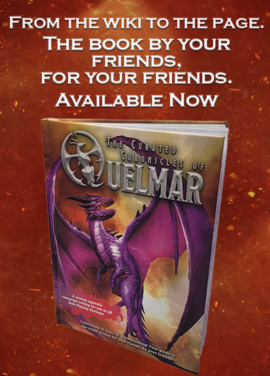Invocation and the first book of The Elegy of Atycos
The Elegy of Atycos is a mythic poetic text of Vaelonic origin, considered by many to be the only known surviving work from the ancient civilization of Vaelon. Preserved through a Oldfairen translation and a set of linguistic ciphers discovered in a cave on an uninhabited island southwest of Alest, the poem recounts the journey of Atycos, a grieving woman who crosses the Bleeding Veil and enters the realm beyond the Flare in search of her vanished husband, Thalos.
First translated and published by Professor Lysander Callis of Briargreen College in 07 C.R., the poem is divided into four major sections, each corresponding to a phase of Atycos’s journey: her departure from Vaelon, the trials beyond the Flare, the encounter with the sorceress Lysera on the Isle of Forgetting, and her sorrowful return home. The themes of love, memory, and loss pervade the work, which is often described as equal parts epic myth and mourning song. Though once dismissed as a symbolic allegory or imaginative fiction, the poem has gained increasing significance among historians and occult scholars for its depiction of a now-lost prehistorical civilization.
History of the Text
The only known copy of The Elegy of Atycos was found in Oldfairen script housed in a disintegrating archive uncovered by a Briargreen-funded expedition in 01 C.R. Led by Professor Callis, the expedition also discovered a system of carved Vaelonic ciphers in a seaside cave on a neighboring island to the southwest of Friþleas. These findings were crucial to the eventual decoding of the Oldfairen translation and the reconstruction of the original mythic structure. The site of the discovery has since been protected by the Alestian Historical Trust.
Though Callis initially posited the possibility of additional stanzas or even a fifth section, no such writings were recovered by the 07 C.R. publication date.
Structure
The Elegy of Atycos is structured in four primary parts:
- Invocation – An appeal to the Muse to recount the journey of Atycos and the sorrow she bears.
- Book I: The Departure – Atycos’s grief and decision to leave Vaelon in search of her lost husband.
- Book II: The Trials Beyond the Flare – Her passage through the Bleeding Veil and encounters with horrors and illusions.
- Book III: The Isle of Forgetting – The seduction and sorrow of Lysera’s palace where Thalos is found but does not remember.
- Book IV: The Return and the Lament – Atycos’s return to a changed Vaelon, her elegiac testimony, and her mysterious disappearance.
The Text
The Elegy of Atycos
An account of the search for meaning, sung in the halls of gods and men
Invocation
Sing, O Muse, of Atycos the sorrowed,
She who braved the Bleeding Veil, the Flare’s cruel maw,
Who wandered the land where time dissolves,
A widow unknowing, a lover unfound,
Seeking the shade of her vanished lord.
Through deathless trials, she walked alone,
Guided by love, yet cursed by fate.
Begin, O Muse, where her grief was sown,
Where noble halls of Vaelon stood,
Spire and dome, gold-wrought and bright,
Now dimmed by woe and silence deep.
I. The Departure
In Vaelon’s heart, where sages dwell,
And scholars weave the light of stars,
Lived Atycos, fair and wise,
Bound to Thalos, bold of heart,
Who, seeking truth beyond the world,
Vanished in the Flare’s embrace.
Woe to the bride who wakes alone,
Who waits at dawn by the empty bed,
And calls for one the winds have swallowed!
Three cycles of the silver moon,
She prayed and wept at the gods' cold feet.
No answer came, no sign was given—
Only the Bleed, seeping forth,
A whispering thing of hungering dark.
Thus Atycos, bound by love,
Did don the cloak of wanderers,
Armed with lore of ages past,
A token clasped against her breast,
A ring of Thalos, cold and pale.
With steps unbent, she crossed the gates,
Where men return not, nor gods may tread.
The Flare she entered, shroud of doom,
And all of Vaelon whispered low,
Mourning their daughter, lost to fate.
II. The Trials Beyond the Flare
Now past the Veil, where sky is none,
Where light and dark entwine as one,
The Bleed did rise, a shifting tide,
That swayed the mind, unmade the past.
Yet Atycos stood, unbroken still,
For love’s strong hand did hold her fast.
Then came the voices, hollow and sweet,
Daughters of sorrow, Sirens unkind,
Who sang of longing, sang of home,
To steal the souls of those who strayed.
With wax and will, she closed her ears,
Let not their song unmake her soul.
She passed the gate where the beast did watch,
A many-mawed, unblinking wretch,
Fangs as spears, a shadow vast,
Snapping at feet of those who fled.
With wit and grace, she swayed and danced,
And left the horror in her wake.
For seven years, she wandered lost,
Through halls of broken time she roamed,
Through cities drowned, through gardens scorched,
Through temples where the gods lay slain.
Still she pressed, still she prayed,
For Thalos’ name upon her lips.
III. The Isle of Forgetting
On shores of dusk, where sun sets not,
She came at last to Lysera’s halls,
A palace bright with jeweled spires,
A sorceress fair, with silver tongue.
“O weary one, lay down thy grief,
Let sorrow die in slumber deep,
Drink, eat, and dream no more of woe.”
Thus spoke the queen, with lips of gold.
Soft were her beds, sweet was her wine,
And Atycos, weary, closed her eyes,
And time was lost, uncounted, pale,
A river without course or end.
But love endures where all else fades,
And in her dreams, her husband called.
She woke with wail, she knew the curse,
The spell unweaving as she rose.
Furious, she seized the queen,
Spoke her name in tones of wrath,
And Lysera, cowed, did yield the truth:
Thalos had come, and Thalos had stayed.
Forgetting all, he had become
A wraith among the dream-bound dead.
IV. The Return and the Lament
Now with a heart of fractured stone,
Atycos fled the queen’s domain,
Forsaking dreams, forsaking rest,
With only sorrow at her side.
Through shifting tides, through whispering voids,
She traced her path, unmade her steps,
And came again to Vaelon’s walls,
A city waned, a kingdom dimmed,
For in her years beyond the world,
Vaelon had bled, had lost its light.
Before the halls of learning’s keep,
She stood and sang of what she saw,
Of what the Bleed would bring in time,
Of what the gods had left untold.
And those who heard her bowed in grief,
For in her tale, the end was writ.
Her love was lost, her soul undone,
Yet still she stood, yet still she warned,
And thus the scribes, with trembling hands,
Wrote the words that must endure:
The Elegy of Atycos,
A song of love and loss.
And when she vanished, none could say
If gods had come or death had called,
Yet still her voice is heard in dreams,
Where lovers weep for those they’ve lost,
And wanderers pray to find their way.
Reception and Legacy
Upon its publication in 07 C.R., The Elegy of Atycos was met with considerable skepticism within academic circles—less for its poetic content and more for the sweeping historical conclusions drawn by Professor Lysander Callis. His accompanying theories on the Vaelonic civilization posited an empire of immense scale and influence, supported by his interpretation of scattered Vaelonic artifacts found on multiple continents across Quelmar. Callis argued that the civilization of Vaelon had once spanned vast regions of the pre-historical world, wielding not only a unifying language and culture but also technologies of such advancement—integrating both science and magick—that they may have exceeded the capabilities of any known society since.
Most controversial, however, was Callis’s assertion that Vaelon could represent the foundation of all human civilization—a cultural progenitor whose collapse marked a forgotten turning point in world history. These claims were widely criticized as speculative, grandiose, and lacking sufficient empirical support, particularly given the ambiguous nature of the source materials: a single Oldfairen manuscript, partial inscriptions, and linguistic ciphers retrieved from a remote island.
Despite these criticisms, The Elegy of Atycos found lasting resonance among occultists, mystics, and fringe historians. Within these communities, Callis’s work is seen not as conjecture but as revelation—a rare surviving voice of a world deliberately erased. The poem’s haunting themes of memory, grief, and lost grandeur have made it a central text in esoteric studies of prehistory, inspiring everything from philosophical treatises to artistic interpretations. Though mainstream academia remains cautious, The Elegy of Atycos continues to provoke debate, inviting readers to consider whether history has truly forgotten Vaelon—or whether Vaelon has simply chosen not to be remembered.

